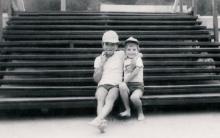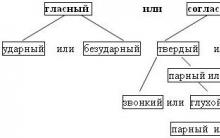What character traits should a person have in order to adequately withstand the trials sent by fate? This is the question Mikhail Sholokhov asks readers in his story “The Fate of Man.”
Since ancient times, the best qualities of character have been considered: honesty, loyalty, hard work, perseverance, generosity, patriotism, selflessness and the ability to love. The main character of the work, Andrei Sokolov, possesses all these qualities. His whole life is proof of this.
Andrei, having managed to push around the world, eventually settled in Voronezh and married his beloved girl, Irina. The young family lived happily and amicably. Out of great love, children were born who always made their parents happy.
The eldest son Anatoly turned out to be very capable of mathematics, they even wrote about him in the newspaper. The hero sees true happiness in simple but very important things: home, peace in the family, healthy children, a loving and understanding wife. Harmony reigns in his life, and the future seems clear and definite. But suddenly war breaks into this carefully built world. Everything that was created with such love is destroyed. Andrei Sokolov begins his confessional story with memories of pre-war life, because over time, what seemed simple and ordinary became even more expensive.
The scene of the hero's farewell to his family is very touching. She reveals to the reader Sokolov’s loving and sensitive soul. He calls his daughters affectionately: “Nastenka and Olyushka.” Andrei Sokolov proves his love and loyalty to his only wife even after her death. After all, several years have passed, and he is still lonely. Andrei recalls with bitterness the dissatisfaction he once showed towards his wife.
Andrei's fate at the front was difficult. He didn't have to fight for long. In May 1942, Andrei was captured by the Nazis near Lozovenki. He was ready to face death courageously, but he was not shot, but taken prisoner. But even in captivity, Sokolov demonstrates the best human qualities: fearlessness, responsiveness, sincerity.
In the scene of Andrei's interrogation by Muller, the character of the hero is especially clearly shown. He openly spoke to the cruel camp commandant about the unbearable living conditions of the prisoners. Andrei behaved very dignified, although his life at that moment completely depended on the commandant. The latter appreciated the prisoner’s courage and called him “a real Russian soldier.” And the respect of the enemy is worth a lot. Andrey, despite his fatigue and hunger, behaves very bravely and preserves his honor.
The gift that Andrei received from the commandant, he honestly divided among all prisoners of war. This act characterizes him as a kind and generous person.
Having escaped from captivity, Andrei Sokolov dreams of returning to his family in Voronezh, but he learns the terrible news about the tragic death of the people dearest to him.
The hero's life lost meaning after the loss of his family. A ray of hope for the revival of the family flashed in Andrei’s soul when he received news from his son. But this hope was also destroyed. My son died on Victory Day...
A person who finds himself in such a situation may become embittered and hate everyone around him. But this does not happen with Andrei Sokolov. Misfortunes and hardships did not harden him. He continues to live and work, although this is not easy for him. One day Andrei accidentally met Vanyusha, an orphan boy, to whom he very quickly became attached and soon adopted him. The hero had enough warmth to warm the orphan and make the boy happier. In return, he found the meaning of life, he realized that it continues, no matter what. This demonstrates the unprecedented strength of his character.
Updated: 2012-04-24
Attention!
Thank you for your attention.
If you notice an error or typo, highlight the text and click Ctrl+Enter.
By doing so, you will provide invaluable benefit to the project and other readers.
The Great Patriotic War, even after many decades, remains the greatest blow for the whole world. What a tragedy this is for the fighting Soviet people, who lost the most people in this bloody battle! The lives of many (both military and civilian) were ruined. Sholokhov's story “The Fate of Man” truthfully depicts these sufferings, not of an individual person, but of the entire people who stood up to defend their Motherland.
The story “The Fate of a Man” is based on real events: M.A. Sholokhov met a man who told him his tragic biography. This story was almost a ready-made plot, but did not immediately turn into a literary work. The writer nurtured his idea for 10 years, but put it on paper in just a few days. And he dedicated it to E. Levitskaya, who helped him publish the main novel of his life, “Quiet Don.”
The story was published in the Pravda newspaper on the eve of the new year, 1957. And soon it was read on All-Union Radio and heard throughout the country. Listeners and readers were shocked by the power and truthfulness of this work, and it gained well-deserved popularity. In literary terms, this book opened up a new way for writers to explore the theme of war - through the fate of a little man.
The essence of the story
The author accidentally meets the main character Andrei Sokolov and his son Vanyushka. During the forced delay at the crossing, the men started talking, and a casual acquaintance told the writer his story. This is what he told him.
Before the war, Andrei lived like everyone else: wife, children, household, work. But then thunder struck, and the hero went to the front, where he served as a driver. One fateful day, Sokolov’s car came under fire and he was shell-shocked. So he was captured.
A group of prisoners was brought to the church for the night, many incidents happened that night: the shooting of a believer who could not desecrate the church (they didn’t even let him out “until the wind”), and with him several people who accidentally fell under machine gun fire, help from a doctor to Sokolov and others wounded. Also, the main character had to strangle another prisoner, since he turned out to be a traitor and was going to hand over the commissioner. Even during the next transfer to the concentration camp, Andrei tried to escape, but was caught by dogs, who stripped him of his last clothes and bit him so much that “the skin and meat flew into shreds.”
Then the concentration camp: inhuman work, almost starvation, beatings, humiliation - that’s what Sokolov had to endure. “They need four cubic meters of production, but for the grave of each of us, one cubic meter through the eyes is enough!” - Andrei said imprudently. And for this he appeared before Lagerführer Müller. They wanted to shoot the main character, but he overcame his fear, bravely drank three glasses of schnapps to his death, for which he earned respect, a loaf of bread and a piece of lard.
Towards the end of hostilities, Sokolov was appointed driver. And finally, an opportunity arose to escape, and even together with the engineer whom the hero was driving. Before the joy of salvation had time to subside, grief arrived: he learned about the death of his family (a shell hit the house), and all this time he lived only in the hope of a meeting. One son survived. Anatoly also defended his homeland, and Sokolov and he simultaneously approached Berlin from different directions. But right on the day of victory, the last hope was killed. Andrey was left all alone.
Subjects
The main theme of the story is a man at war. These tragic events are an indicator of personal qualities: in extreme situations, those character traits that are usually hidden are revealed, it is clear who is who in reality. Before the war, Andrei Sokolov was not particularly different; he was like everyone else. But in battle, having survived captivity and constant danger to life, he proved himself. His truly heroic qualities were revealed: patriotism, courage, perseverance, will. On the other hand, a prisoner like Sokolov, probably also no different in ordinary peaceful life, was going to betray his commissar in order to curry favor with the enemy. Thus, the theme of moral choice is also reflected in the work.
Also M.A. Sholokhov touches on the topic of willpower. The war took away from the main character not only his health and strength, but also his entire family. He has no home, how can he continue to live, what to do next, how to find meaning? This question has interested hundreds of thousands of people who have experienced similar losses. And for Sokolov, caring for the boy Vanyushka, who was also left without a home and family, became a new meaning. And for his sake, for the sake of the future of his country, you need to live on. Here is the disclosure of the theme of the search for the meaning of life - a real person finds it in love and hope for the future.
Issues
- The problem of choice occupies an important place in the story. Every person faces a choice every day. But not everyone has to choose on pain of death, knowing that your fate depends on this decision. So, Andrei had to decide: to betray or remain faithful to the oath, to bend under the blows of the enemy or to fight. Sokolov was able to remain a worthy person and citizen because he determined his priorities, guided by honor and morality, and not by the instinct of self-preservation, fear or meanness.
- The whole fate of the hero, in his life trials, reflects the problem of the defenselessness of the common man in the face of war. Little depends on him; circumstances are falling on him, from which he is trying to get out at least alive. And if Andrei was able to save himself, then his family was not. And he feels guilty about it, even though he isn't.
- The problem of cowardice is realized in the work through secondary characters. The image of a traitor who, for the sake of immediate gain, is ready to sacrifice the life of a fellow soldier, becomes a counterweight to the image of the brave and strong-willed Sokolov. And there were such people in the war, says the author, but there were fewer of them, that’s the only reason we won.
- The tragedy of war. Numerous losses were suffered not only by the military units, but also by civilians who could not defend themselves in any way.
- Andrei Sokolov is an ordinary person, one of many who had to leave their peaceful existence in order to defend their homeland. He exchanges a simple and happy life for the dangers of war, without even imagining how he can remain on the sidelines. In extreme circumstances, he maintains spiritual nobility, shows willpower and perseverance. Under the blows of fate, he managed not to break. And find a new meaning in life, which reveals his kindness and responsiveness, because he sheltered an orphan.
- Vanyushka is a lonely boy who has to spend the night wherever he can. His mother was killed during the evacuation, his father at the front. Tattered, dusty, covered in watermelon juice - this is how he appeared before Sokolov. And Andrei could not leave the child, he introduced himself as his father, giving both himself and him a chance for a further normal life.
Characteristics of the main characters
What is the meaning of the work?
One of the main ideas of the story is the need to take into account the lessons of the war. The example of Andrei Sokolov shows not what war can do to a person, but what it can do to all of humanity. Prisoners tortured in concentration camps, orphaned children, destroyed families, scorched fields - this should never be repeated, and therefore should not be forgotten.
No less important is the idea that in any, even the most terrible situation, one must remain human and not become like an animal that, out of fear, acts only on the basis of instincts. Survival is the main thing for anyone, but if this comes at the cost of betraying oneself, one’s comrades, one’s Motherland, then the surviving soldier is no longer a person, he is not worthy of this title. Sokolov did not betray his ideals, did not break, although he went through something that is difficult for a modern reader to even imagine.
Genre
A short story is a short literary genre that reveals one storyline and several characters. “The Fate of Man” refers specifically to him.
However, if you take a closer look at the composition of the work, you can clarify the general definition, because this is a story within a story. First, the story is narrated by the author, who, by the will of fate, met and talked with his character. Andrei Sokolov himself describes his difficult life; the first-person narration allows readers to better understand the hero’s feelings and understand him. The author's remarks are introduced to characterize the hero from the outside (“eyes, as if sprinkled with ashes,” “I didn’t see a single tear in his seemingly dead, extinct eyes... only his large, limply lowered hands trembled slightly, his chin trembled, his hard lips trembled”) and show how deeply this strong man suffers.
What values does Sholokhov promote?
The main value for the author (and for readers) is peace. Peace between states, peace in society, peace in the human soul. The war destroyed the happy life of Andrei Sokolov, as well as many people. The echo of the war still does not subside, so its lessons should not be forgotten (although this event has often recently been overestimated for political purposes that are far from the ideals of humanism).
Also, the writer does not forget about the eternal values of the individual: nobility, courage, will, desire to help. The time of knights and noble dignity has long passed, but true nobility does not depend on origin, it is in the soul, expressed in its ability to show mercy and empathy, even if the world around it is collapsing. This story is a great lesson in courage and morality for modern readers.
Interesting? Save it on your wall!Characteristics of the hero
The name of M. A. Sholokhov is known to all mankind. In the early spring of 1946, that is, in the first post-war spring, M.A. Sholokhov accidentally met an unknown man on the road and heard his confession story. For ten years the writer nurtured the idea of the work, events faded into the past, and the need to speak out increased. And so in 1956 he wrote the story “The Fate of Man.” This is a story about the great suffering and great resilience of the ordinary Soviet man. The best features of the Russian character, thanks to whose strength the victory in the Great Patriotic War was won, M. Sholokhov embodied in the main character of the story - Andrei Sokolov. These are traits such as perseverance, patience, modesty, and a sense of human dignity.
Andrei Sokolov is a tall man, stooped, his hands are large and dark from hard work. He was dressed in a burnt padded jacket, which had been mended by an inept male hand, and his general appearance was unkempt. But in the appearance of Sokolov, the author emphasizes “the eyes, as if sprinkled with ashes; filled with such inescapable melancholy.” And Andrei begins his confession with the words: “Why, life, did you cripple me like that? Why did you distort it like that?” And he cannot find the answer to this question.
The life of an ordinary person, the Russian soldier Andrei Sokolov, passes before us. . Since childhood, I learned how much a “pound is worth,” and during the civil war he fought against the enemies of Soviet power. Then he leaves his native Voronezh village for Kuban. Returns home, works as a carpenter, mechanic, driver, and starts a family.
With trepidation, Sokolov recalls pre-war life, when he had a family and was happy. The war ruined this man’s life, tore him away from home, from his family. Andrei Sokolov goes to the front. From the beginning of the war, in its very first months, he was wounded twice and shell-shocked. But the worst thing awaited the hero ahead - he falls into fascist captivity.
Sokolov had to experience inhuman torment, hardship, and torment. For two years, Andrei Sokolov steadfastly endured the horrors of fascist captivity. He tried to escape, but was unsuccessful; he dealt with a coward, a traitor who was ready to hand over the commander to save his own skin.
Andrei did not lose the dignity of a Soviet man in a duel with the commandant of the concentration camp. Although Sokolov was exhausted, exhausted, exhausted, he was still ready to face death with such courage and endurance that he amazed even the fascist. Andrei still manages to escape and becomes a soldier again. But troubles still haunt him: his home was destroyed, his wife and daughter were killed by a fascist bomb. In a word, Sokolov now lives only with the hope of meeting his son. And this meeting took place. For the last time, the hero stands at the grave of his son, who died in the last days of the war.
It seemed that after all the trials that befell one person, he could become embittered, break down, and withdraw into himself. But this did not happen: realizing how difficult the loss of relatives is and the joylessness of loneliness, he adopts the boy Vanyusha, whose parents were taken away by the war. Andrey warmed and made the orphan's soul happy, and thanks to the warmth and gratitude of the child, he himself began to return to life. The story with Vanyushka is, as it were, the final line in the story of Andrei Sokolov. After all, if the decision to become Vanyushka’s father means saving the boy, then the subsequent action shows that Vanyushka also saves Andrei and gives him a meaning for his future life.
I think that Andrei Sokolov is not broken by his difficult life, he believes in his strength, and despite all the hardships and adversities, he still managed to find the strength to continue living and enjoy his life!
The immortal work of M. A. Sholokhov “The Fate of Man” is a real ode to the common people, whose life was completely broken by the war.
Features of the story composition
The main character here is presented not as a legendary heroic figure, but as a simple person, one of the millions of people who were touched by the tragedy of the war.
The fate of man in wartime
Andrei Sokolov was a simple rural worker who, like everyone else, worked on a collective farm, had a family and lived an ordinary measured life. He boldly goes to defend his fatherland from the fascist invaders, thus leaving his children and wife to the mercy of fate.
At the front, the main character begins those terrible trials that turned his life upside down. Andrei learns that his wife, daughter and youngest son were killed in an air attack. He takes this loss very hard, as he feels his own guilt for what happened to his family.
However, Andrei Sokolov has something to live for; he still has his eldest son, who during the war was able to achieve significant success in military affairs, and was his father’s only support. In the last days of the war, fate prepared the last crushing blow for Sokolov; his son was killed by his opponents.
At the end of the war, the main character is morally broken and does not know how to live further: he lost his loved ones, his home was destroyed. Andrey gets a job as a driver in a neighboring village and gradually begins to drink.
As you know, fate, which pushes a person into the abyss, always leaves him a small straw through which, if desired, he can get out of it. Andrei's salvation was a meeting with a little orphan boy whose parents died at the front.
Vanechka had never seen his father and reached out to Andrei, because he longed for the love and attention that the main character showed to him. The dramatic peak in the story is Andrei’s decision to lie to Vanechka that he is his own father.
An unfortunate child, who has never known love, affection or kindness towards himself in his life, throws himself in tears on Andrei Sokolov’s neck and begins to say that he remembered him. So, in essence, two destitute orphans begin their life journey together. They found salvation in each other. Each of them gained a meaning in life.
The moral “core” of Andrei Sokolov’s character
Andrei Sokolov had a real inner core, high ideals of spirituality, steadfastness and patriotism. In one of the episodes of the story, the author tells us how, exhausted by hunger and labor in a concentration camp, Andrei was still able to maintain his human dignity: for a long time he refused the food that the Nazis offered him before they threatened to kill him.
The strength of his character aroused respect even among the German murderers, who ultimately had mercy on him. The bread and lard that they gave to the main character as a reward for his pride, Andrei Sokolov divided among all his starving cellmates.
downloadAudio story by Mikhail Aleksandrovich Sholokhov "The Fate of a Man". The story of Andrei Sokolov's family before the war, the beginning of the story.
The author’s meeting in the first post-war spring on the Upper Don, at the crossing of the Elanka River on the way to the village of Bukanovskaya, opposite the Mokhovsky farm, with the main character of the story “The Fate of a Man.” Andrei Sokolov was a tall, stooped man, his eyes “as if sprinkled with ashes” and filled with “an inescapable mortal melancholy.” Andrei Sokolov was walking with a boy about 5-6 years old, whom he called son. We had to wait two hours for the boat. So Andrei Sokolov told the story of his life, a painful one. He himself is a native of the Voronezh province, born in 1900. During the civil war he was in the Red Army, in the Kikvidze division. In the famine of 1922, he lost all his relatives. He started life again in Voronezh, in a carpentry artel, then went to a factory and learned to be a mechanic. Got married. His wife, Irinka, was an orphan from an orphanage. Good. Quiet, cheerful, obsequious and smart. They had three children. The eldest son Anatoly, then the same age daughters Nastenka and Olyushka. The children studied excellently. Anatoly was gifted in mathematics, they even wrote about him in the central newspaper. For ten years they saved up for a new house. Irina bought two goats. All was good. Then the war began. Irina said goodbye to her husband very bitterly, saying goodbye that they would not see each other in this world.











About a six-day work week With a 6-day
What is a social worker?
Root hermitage in the Kursk region: the story of a miracle Root hermitage prayer service for the sick
Ceremonial signing of the agreement Ceremony of signing the cooperation agreement
Conditions and procedure for venerating the relics of St.